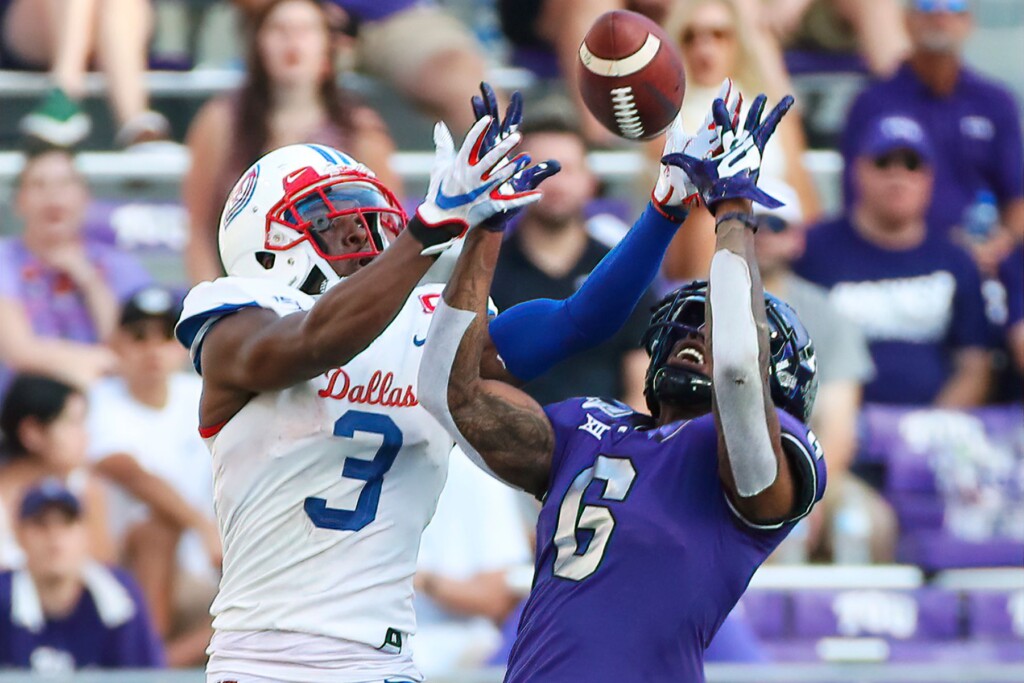I wrote a piece last week about SMU’s very obvious, very desperate quest to move to a new conference, and why it regrettably made a bunch of sense. In the interest of self-promotion, I’ll say that if you’re a Mustangs fan who hasn’t read it, you should, because it’s pertinent to your interests. (In which case, go here, then mosey on back this way once you’re done.)
But if you have read it and/or you care about a college football team other than SMU, the evergreen takeaways can be found in the first sentence:
College football realignment absolutely sucks, and the suckiest part of all is that there’s no end to it on the horizon.
And the last:
But what is dignified about college athletics anymore, anyhow?
We now live in a world where a regional sport propped up by tradition, rivalry, and history continues to give way to forces pushing it toward a nationalized, semi-professional sport in which a handful of haves will someday break away from the have-nots. Once you accept that framework, as pretty much every power broker in the sport has either by choice or circumstance, absolutely anything tearing at the fabric of what makes college football special makes sense if it fits neatly in the bland, soulless, very sucky place the sport is heading.
That’s the backdrop to consider in light of The Action Network’s Brett McMurphy reporting that TCU is “indefinitely ‘pausing’ its series with SMU after the 2025 game.” So, no more Iron Skillet, the rivalry which will be played for the 102nd time this fall. That means saying goodbye to the most significant festival of college sports hatred belonging exclusively to North Texas, considering that none of the pomp, circumstance, lore, and general importance of the Red River Rivalry makes up for the fact that neither Texas nor Oklahoma are located within 175 miles of here. This, at a time when enmity between the two fanbases is at a decades-long high after head coach Sonny Dykes jumped ship from the Mustangs to the Horned Frogs.
And for what, exactly? I put out a request for comment from TCU’s athletic department to discern that. They sent back a statement from TCU athletic director Jeremiah Donati that read as follows:
“We have a tremendous respect for SMU and the Battle for the Iron Skillet which dates back over one hundred years. Playing more home games has been a priority for us and our fans and is most importantly in the best interest of the TCU Football program. We look forward to annually having seven home games and as many as eight in certain years. As our future non-conference schedules evolve, we keep open the possibility of future games with the Mustangs.”
That lines up neatly with Dykes’ comments earlier this summer at the Texas Coaches Convention, in which he characterized nonconference scheduling amounts to taking care of season-ticket holders first (that’s Donati’s reference to increased home games at work), “the end goal”—read: College Football Playoff hopes—second, and added that “[the TCU-SMU] rivalry’s one of those things that we’ll kind of see how it plays out and how it fits into the whole thing.”
That is the alpha and omega of this conversation. There is no room for tradition if it carries any chance of damaging upfront profits or the prospect of moonshot outcomes. In college football’s new world order, SMU—whose revenue is capped by the American Athletic Conference’s lack of cachet and accompanying media rights deal—does not matter as much as a TCU program that is fresh off a gloriously improbable run to the national championship game and is positioned to be a kingpin in the reconfigured Big 12 in 2024. If the Horned Frogs beat the Mustangs, it does little to help their hopes of making the College Football Playoff. If they don’t, it seriously dents those hopes. So TCU calculated the potential dollars derived from making the playoff, figured out the percentage chance of losing to SMU in a given year moving forward, weighed them against one another, and made a call.
There is nothing wrong with TCU striving to be more than it ever has been, mind you; that’s healthy. But nothing short of multiple national titles could ever compel people outside of North Texas to care about TCU football as fervently as those in Dallas and Fort Worth do for that Saturday each fall when two fanbases come together and loathe the hell out of each other and watch their football teams make a memory. The shrinking world the Horned Frogs so desperately want to inhabit is the same one that will pay it less and less mind unless it somehow gets those multiple championships. It is unlikely that TCU will even get multiple championship-game appearances. They and every other program that can’t crack a top-15 recruiting class—much less string several together—are destined to be little more than bumps in the road, barely in the way of perpetually better-funded programs’ path to national titles, because that’s how college football works. The Horned Frogs are nowhere close to breaking into that rarefied recruiting air, either. Per 247 Sports’ Composite rankings, which date back to 1999, the Horned Frogs’ best-ever class—in 2016—ranks 21st. Its 2024 class currently ranks 41st. That is a cold, cruel reality, but coldness and cruelty are the currency of the environment in which TCU hopes to belong. And they just lopped off a key piece of their history for a smidgen better chance at doing so.
The irony, of course, is that beyond its own borders, nowhere does TCU mean more than in the hearts and minds of SMU fans. That’s the beauty of rivalries: they’re mutual elevators, conveying importance on each party alongside all that hatred and enmity. In 2021, the year before TCU’s Cinderella season, SMU was the only team in America that gave a damn about going to Amon G. Carter Stadium as the Horned Frogs slogged their way to a 5-7, bowl-less season. The ensuing 42-34 shootout, which SMU won, was far and away the biggest moment TCU played a part in that year. If that’s an inconvenient truth, it’s only because it gets in the way of who the Horned Frogs see themselves as now, not who they were 12 months ago.
And maybe they’re right. TCU’s outlook has never been brighter as the possible head of a conference that, while diminished, remains the same brand name that paid them zero mind 20 years ago. The question isn’t if the Horned Frogs are ascending; it’s whether they can defy enormous odds and barge into the stratosphere only one school their size—Notre Dame—compete in with any measure of regularity. The data says they can’t, but teams don’t often storm to a national title game with a first-year head coach the season after going 5-7, either.
But for more than a century, whether TCU soared or whether it face-planted, SMU was always waiting on them, eager to duke it out for the right to be kings of the only terrain that always loves them both. That’s gone now, not a direct casualty of realignment like Oklahoma and Oklahoma State’s Bedlam Rivalry, but certainly caught in the aftershocks of it. The Horned Frogs chose this, and soon, falls around here will be a little less fun. And you can chalk that up to the same forces that are driving their former arch-rival to throw themselves at the ACC’s feet for zero money upfront: because college athletics are a sucky world, and there’s not much dignified left in it.
Author







